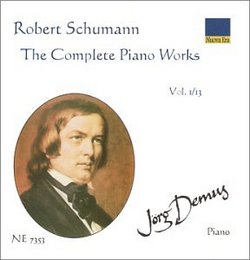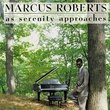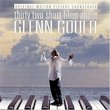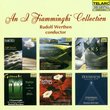| All Artists: Robert Schumann, Jörg Demus Title: Schumann: The Complete Piano Works (Box Set) Members Wishing: 0 Total Copies: 0 Label: Nuova Era Release Date: 3/6/2001 Album Type: Box set Genres: Dance & Electronic, Special Interest, Classical Styles: Marches, Chamber Music, Forms & Genres, Concertos, Fantasies, Sonatas, Toccatas, Historical Periods, Classical (c.1770-1830), Romantic (c.1820-1910) Number of Discs: 13 SwapaCD Credits: 13 UPCs: 723724073128, 8010984173531, 072372407312 |
Search - Robert Schumann, Jörg Demus :: Schumann: The Complete Piano Works (Box Set)
 | Robert Schumann, Jörg Demus Schumann: The Complete Piano Works (Box Set) Genres: Dance & Electronic, Special Interest, Classical |
Larger Image |
CD DetailsSimilarly Requested CDs
|
CD ReviewsMystery meat Wayne A. | Belfast, Northern Ireland | 04/10/2006 (5 out of 5 stars) "I don't think I've ever before experienced such frustration in trying to assess a product. Here a well-regarded and fairly well-known pianist sits down and records all (even that's up for grabs) the piano music of a pretty well-known and well-regarded composer and barely a peep out there in Internet land. What I did encounter after a lot of searching, and according to different reviewers who deigned to barely mention this bulky and hard-to-ignore boxed set, was this dopey basketful of professional opinions: 1) The recording quality was poor according to one guy 2) The piano was out of tune according to some editor who happened to also be a piano tuner 3) The music was criminally recorded using a piano with beat hammers and strings 4) Demus may or may not have recorded the set with a period instrument that also may have had beat hammers and strings 5) Nobody should record Schumann on a period instrument according to another expert (without really letting us know if this was the case here) 6) The interpretations were wooden 7) The interpretations were fabulous despite the crappy sound and beat up old out-of-tune piano 8) Nobody was sure if this was his complete Schumann recorded in the 1970s and released on Musical Heritage or these were new DDD recordings as listed OK--as the notes with this set absolutely stink and no one out in Internet land seems to have any consistent and coherent thing to say about it, this then is my judgement, based on careful listening and a few intelligent guesses. 1) The interpretations are great, wonderful, really enjoyable, idiomatic--some might consider them slightly wooden because there's next-to-no pedal which leads me to believe it is a period instrument he's recorded on. This isn't Argerich slamming away at these so don't expect that. Yamaha fans will be disappointed. Demus clearly knows his Schumann and plays crisply and accurately. 2) The sound quality, while hardly SACD, is just fine and, again if this is a period instrument and I sure tend to think so, what I'm hearing would be about right. I rather like the engineering as the result is intimate and warm 3) Honestly, did Demus record all these in the 1970s without them getting any attention and then do it all over again in the 1980s just to get ignored again? I hear distinct tape hiss if I listen closely, this doesn't sound like a 1989 DDD recording (which the box claims it to be) which is probably why the recording has some warmth and (audible tape hiss) 4) Who am I to argue with an editor/piano tuner but if this piano is out of tune I'm not noticing it one zot. Also, didn't they tune pianos a little differently way back in 1850 or so? SO--I'll guess this is the complete piano music of Robert Schumann (perhaps minus one small piece according to yet another miffed commentator, although he keeps talking about a 12 CD set and this has 13 discs!)recorded in the 1970s with Jorg Demus playing a piano built around 1850 or so with everything that implies. I'll also guess that a lot of reviewers out there, left to fend for themselves without some promotional sheet from the label, maybe without even free promo copies, were really reaching a bit. Even if I'm wrong I seem to be doing better than the second-guessing I found elsewhere and anyway the result is really enjoyable. I simply like this set a lot even if someday I may discover it is, in fact, Ernest Borgnine playing a badly tuned pool hall upright in 1953. Less than no stars to Nuovo Era for never seeming to get the presentation of this delightful set right--license it to Brilliant and they'll do it up properly for Pete's sake and maybe you'll actually sell a few. They might even be able to kick down that DDD tape hiss a bit. It's also too danged expensive given even the putative late recording date--it shouldn't be more than $120 under any circumstances. I got mine for less than $40 at a classical cut-outs and deletions place. Conclusion: This whole situation is sad. Jorg Demus is a great pianist and he obviously loves Schumann. Schumann's piano music is worth the effort. This should be a well-known and highly-regarded set and I'm happier with this than with any other big box of piano I may own, short of a Brahms set." Mystery Solved boldsworthington | Washington, DC, United States | 10/06/2006 (5 out of 5 stars) "First off, thanks to Wayne A. for his extremely thoughtful and comprehensive review, which helped me decide to purchase this Nuova Era set (his reasoning about the unlikelihood that Demus would record this huge corpus again was especially insightful). I own the original 20-LP/6-volume Musical Heritage Society set issued between 1971 and 1973. Having seen the CD set in a store last year, I was puzzled about whether it was a transfer of these invaluable discs, which contain vast tracts of Schumann that you will be hard pressed to find elsewhere (included, for instance, are several posthumously issued works and even a few pieces played from unpublished manuscripts). Wayne's review gave me enough clues to suspect that these discs were exactly what I'd been waiting for. Having just received them, I'm happy to confirm that they are indeed the MHS performances (minus most of the four-hand works, however; see below). I instantly recognized the character of the piano sound and the recording acoustic (both much improved on CD), and a quick check of rhetorical gestures in a sonata movement that I especially value in Demus's hands showed the CD and LP versions to be identical. MHS did not always provide track timings for individual sections of the big piano suites. But where such detail exists, respective CD and LP timings are consistently mere seconds apart -- easily the result of different engineering choices for silent lead-ins and lead-outs to each track. A further clue comes from a small note on the jewel-box tray inserts, indicating a 1989 digital remastering. I can think of no fully digital (DDD) recording that would be getting remastered so early in CD history. Anything from the '80s would almost certainly be making its first appearance in the new storage medium. Moreover, the sound has none of the hallmarks of DDD recordings (as Wayne notes, for instance, Demus's recordings have detectable [but nonintrusive] background hiss). So for all these reasons, I feel confident in declaring that this set is basically the old MHS offering. There are two sad omissions, however: (1) The CD set includes all the solo pieces in the LP set, as well as a short, posthumously published F-minor Scherzo on CD 12 that MHS seems to have left out. Nuova Era, alas, omits the vast majority of the often-delightful four-hand works, for which Norman Shetler joined Demus (most of these items appeared in MHS's five-disc finale). The Sketches for Pedal Piano, Opp. 56 & 58, are here (perhaps because they were originally conceived for a now-forgotten solo instrument that had a pedalboard [Alkan was said to have been its greatest master]; on a modern instrument, Schumann's pedal-piano music thus takes two pianists), but -- shame on Nuova Era! -- Shetler gets no credit as the second pianist. If you'd like a fine but inexpensive tour of the four-hand output, try the three-disc VoxBox ("Schumann Complete Works For Piano 4-Hands") featuring Peter Frankl, András Schiff, et al. (2) The CD set lacks the superb MHS album notes by Douglas Townsend. Also missing is Demus's own illuminating statement about recording these works across a span of about three years. These are thoroughly digested interpretations: Demus not only memorized every note but also played every last work in concert. Complete recordings like this one are not necessarily commercial gimmicks, as some so carelessly assert. A serious and sensitive musician who takes on such a task will uncover secrets and interconnections that only exposure to a composer's full output in a given area can progressively disclose. As Demus explains (in Herman Adler's translation from the German), "Only by knowing Schumann's creative output in its totality has it been possible to uncover fresh facets in overfamiliar standard works. [. . .] In the music of no other composer do we find as many cross-relations and associations throughout his work. Schumann likes to quote himself as well as other composers, as did, later, his French brother-in-spirit, Claude Debussy. [. . .] Only knowledge of this entire universe will result in something I would call *Stilsicherheit* (stylistic assurance)." But let's not dwell on what's *not* here. As Wayne observes, this is a deeply rewarding collection that every serious Schumann-lover will want to explore. Are these performances the last word on Schumann's poetic realm? Of course not: no such "last word" exists. The essential thing is that throughout this enormous journey, Demus never falsifies the music, and he plays with an honesty that can be far more illuminating than flashier approaches. So, Schumann-lovers, get this set as cheaply as you can -- but one way or another, get it *while* you can!" Schumann: the personification of the Romantic ages! Hiram Gomez Pardo | Valencia, Venezuela | 08/06/2007 (5 out of 5 stars) "
For some, Robert Schumann was the genuine personification of the XIX Century. If we analyze his entire life, surely we would be unable to find other composer more enrooted conscious or unconsciously with basic premises of this artistic movement. No other composer in that Century could shape with major vigor such level of febrile poetry, bowing phlegm, imaginative restless, fiery melodic fantasy and unequaled introspection those well known facets of his intimacy like him. Since his stormy love affair and marriage with Clara Wieck, his terrible personal disgrace when he maimed his finger pursuing major virtuosity, until his progressive metal illness and final breakdown. But on the other hand, he anticipated by far the initial seed of the Symphonic poem, through his countless and dissected works of marked self biographical landmark or those lovable pieces dedicated to his daughter, moreover he influenced in straight line to Claude Debussy because somehow he depicted the first signals of a unthinkable musical Impressionism, but take a look around his Third Symphony for instance, Carnival for piano and his unforgettable and majestic lieder, as human being he remarked the grandness of his contemporary Chopin and torched the path for other late composers. There have been relatively few pianist really worried for diffusing his entire work for piano with such level of vehemence and rapture. And Demus, indeed, has been one of of them. His lavish musicality, articulated fingering and golden phrasing deserves him a very special place among the great ones at the moment to make a selected list among the most remarkable interpreters of Schumann's bequeath for the piano. " |








